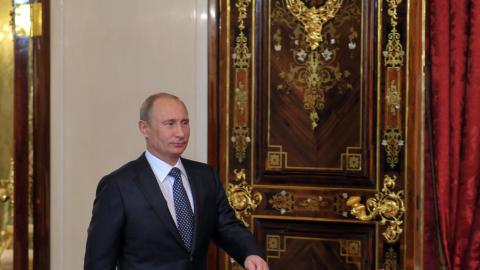In the Ukraine war, the United States has developed a novel strategy: boiling the frog. If Russian leader Vladimir Putin feels the full brunt of Western capabilities at once, the thinking goes, he may react unpredictably. If, however, the West turns up the heat slowly—by spacing out the delivery of key weapons and restricting their use—Putin will accept each incremental increase. One day, he’ll wake to find it’s too late. He’s already cooked.
But this strategy prolongs the war. It ties Ukraine’s hands, preventing it from exploiting Russian vulnerabilities in a timely manner. While Ukraine pays in blood, Putin has time to regroup and revise his strategy to account for whatever new weapons Ukraine has received that month.
The supply of battle tanks is a case in point. For months supporters of Ukraine issued calls to supply it with tanks, which the Biden administration rejected.
The White House reversed course when it became obvious Putin was prepping the battlefield for a new offensive, strengthening his lines and pummeling Ukrainian positions with artillery barrages. By the time Western tanks finally arrive on the battlefield, the offensive will already be underway and launched from newly fortified positions.
The Biden administration has exercised such caution because it worries about triggering a nuclear war. But this telegraphing of fear signals to Putin that the mere threat of nuclear escalation will wring concessions from the West. By rewarding nuclear brinksmanship, the Biden team is increasing, not decreasing, the odds of escalation.
Indeed, a close examination of Putin’s saber-rattling reveals that it comes not in response to setbacks on the battlefield but to expressions by US leaders of reluctance to support Ukraine’s war aims. Putin is not suicidal. He has remained at the helm for over two decades, in part due to his respect for the logic of deterrence. Unable to take even the Donbas after a year of combat operations, he knows his degraded military is no match for the US and NATO. He has no intention of going to war with the West.
Vladimir Lenin supposedly said, “Probe with bayonets. If you find mush, you proceed. If you find steel, you withdraw.” Putin has yet to find steel in the American position.
After announcing tanks for Ukraine, the Biden administration reconfirmed that its objective is not to attain victory but to force Russia to the negotiating table, where Ukraine will also be asked to make concessions. On cue, Putin threatened the West with annihilation at last week’s commemoration of the 80th anniversary of the Battle of Stalingrad.
To flip the script, the United States should set as its strategic goal the full liberation of Ukraine, provided Ukraine is willing to continue the fight. By setting down a powerful marker, the Biden administration would demonstrate to Putin the futility of his threats, strengthen Ukrainian morale and create the conditions that would foster a true spirit of compromise in Moscow.
A policy aimed to achieve a Ukrainian victory would also establish the principle that nuclear blackmail won’t be rewarded. Putin’s inversion of the logic of nuclear deterrence—utilizing it not as a defensive concept but for offensive blackmail—will have failed.
Moreover, a policy of victory would give the administration a clear goal around which to rally the American people. And it would signal to China, as well as to our allies, that the United States has the political will to back its partners even in the toughest of circumstances.
Perhaps most important, however, it would give Ukraine a better chance at survival. The administration’s focus on forging a military balance that eventually yields a negotiated solution is premised on the total exhaustion of both Russia and Ukraine. By insisting that its weapons not be used to strike Russia (or even Crimea), Western policy ensures the destruction of vast swaths of Ukrainian territory while leaving Russia unharmed.
By contrast, a policy aimed at victory would provide Ukraine with access to advanced unmanned aerial vehicles, fighter jets and long-range systems like the Army Tactical Missile System that can hold Russian supply chains at risk, including inside Russia proper, and shorten the war.
Undoubtedly, Putin would look at such a development with frustration, even anger. But with the US committed to Ukraine’s victory, no amount of cunning or bluster could arrest the collapse of his imperial project.
The boiled frog strategy assumes that Putin will wake up, realize that the cost of the war is too great to bear and sue for peace. But the only way to bring him to his senses is to turn up the heat.

















